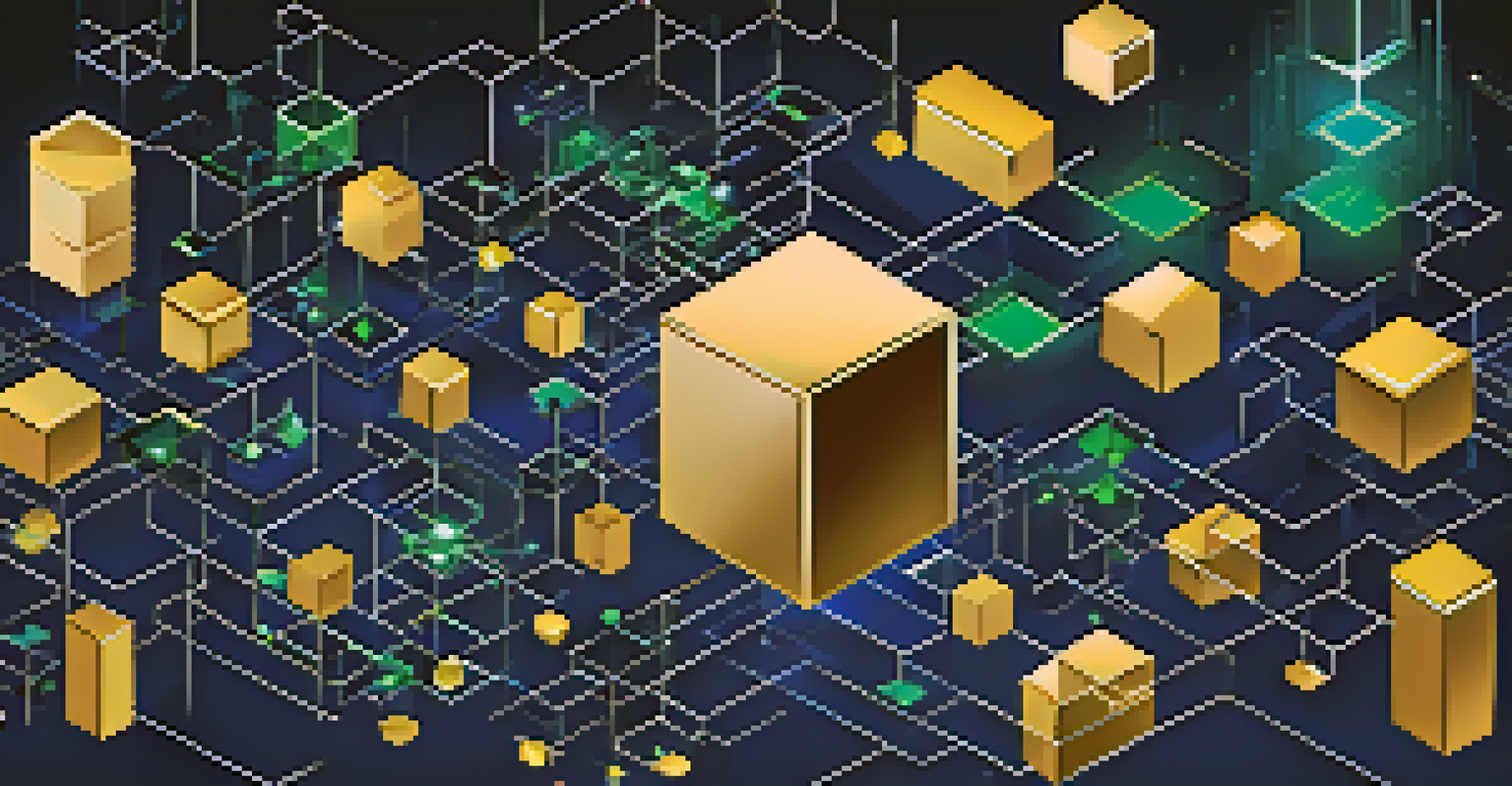5G and Blockchain: A Powerful Combination for Security

Understanding 5G and Its Impact on Connectivity
5G, the fifth generation of mobile networks, represents a significant leap in connectivity. It offers faster speeds, lower latency, and the ability to connect many devices simultaneously. This enhanced connectivity is crucial for the growing Internet of Things (IoT), where everyday objects communicate over the internet.
The future is already here — it's just not very evenly distributed.
As more devices become interconnected, the volume of data being transmitted increases exponentially. This surge in data traffic calls for robust security measures to protect sensitive information. With its capabilities, 5G can support the infrastructure needed for secure data transmission.
By providing a seamless connection, 5G paves the way for innovative applications, from smart cities to telemedicine. However, as opportunities grow, so do the vulnerabilities, making it essential to explore solutions that can ensure security.
An Introduction to Blockchain Technology
Blockchain is a decentralized digital ledger that records transactions across multiple computers. This technology ensures that the information is secure, transparent, and immutable, meaning once data is recorded, it cannot be altered retroactively. Such characteristics make blockchain a promising solution for various industries, from finance to supply chains.

Think of blockchain as a digital chain of blocks, each containing a set of transactions. This chain is maintained across a network of computers, meaning there is no single point of failure. So, even if one node is compromised, the entire system remains secure.
5G Enhances Connectivity and Speed
5G significantly increases internet speeds and reduces latency, enabling seamless communication for a growing number of connected devices.
With its ability to enhance transparency and trust, blockchain can address many security challenges posed by the digital age. Its applications are diverse, from cryptocurrency to securing personal data, making it a vital component in the search for secure solutions.
The Intersection of 5G and Blockchain
When 5G and blockchain come together, they create a powerful synergy that enhances security and efficiency. The ultra-fast speeds of 5G enable real-time data processing and communication, while blockchain ensures that this data remains secure and tamper-proof. This combination is particularly beneficial in environments where data integrity is critical.
Blockchain is the tech. Bitcoin is merely the first mainstream manifestation of its genius.
For instance, in supply chain management, 5G can facilitate real-time tracking of goods while blockchain verifies the authenticity of each transaction. This dual approach not only improves operational efficiency but also builds trust among stakeholders.
Moreover, as 5G expands the reach of IoT devices, blockchain can provide the necessary security framework to protect the vast amounts of data generated. Together, they offer a comprehensive solution for safeguarding digital assets and maintaining accountability.
Enhancing Security with 5G and Blockchain
The integration of 5G and blockchain significantly enhances security protocols. With 5G's low latency, transactions can be executed almost instantaneously, while blockchain's encryption mechanisms protect data from unauthorized access. This is especially critical in sectors like finance and healthcare, where sensitive information is routinely exchanged.
For example, in healthcare, patient data can be securely transferred in real-time using 5G, while blockchain ensures that this data is only accessible by authorized personnel. This not only protects patient privacy but also enhances the overall quality of care.
Blockchain Secures Data Transactions
Blockchain technology provides a decentralized, transparent, and immutable way to record transactions, ensuring data integrity and security.
Additionally, the decentralized nature of blockchain makes it challenging for cybercriminals to launch successful attacks. By distributing data across a network, even if one node is compromised, the rest of the network remains intact, providing an added layer of security.
Real-World Applications of 5G and Blockchain
Numerous industries are beginning to harness the combined power of 5G and blockchain. For instance, in the automotive sector, connected vehicles can communicate with each other and traffic systems via 5G. Blockchain can then verify the data exchanged, ensuring that the information is accurate and trustworthy.
Another exciting application is in the realm of smart contracts, which are self-executing contracts with the terms directly written into code. With 5G enabling quicker communication, these contracts can be executed almost instantaneously, while blockchain guarantees their security and reliability.
From supply chains to energy management, the potential applications are vast. As more businesses recognize the benefits of this combination, we can expect to see a surge in innovative solutions that enhance security and efficiency.
Challenges and Considerations in Implementation
Despite the promising benefits of integrating 5G and blockchain, several challenges exist. One major hurdle is the need for widespread infrastructure development. For 5G networks to be effective, significant investment is required to build the necessary physical and digital infrastructure.
Furthermore, ensuring interoperability between different blockchain platforms and 5G networks is crucial. As various providers emerge, standardization becomes essential to facilitate seamless communication and data exchange.
5G and Blockchain Synergy
The integration of 5G and blockchain creates a powerful solution for enhancing security and efficiency across various industries, including healthcare and supply chains.
Lastly, regulatory and privacy concerns must be addressed. As these technologies evolve, lawmakers need to establish guidelines that protect users while fostering innovation. Balancing security and accessibility will be key to successful implementation.
The Future of Security with 5G and Blockchain
Looking ahead, the combination of 5G and blockchain holds incredible promise for enhancing security across various sectors. As technology continues to evolve, we can expect new applications that leverage these advancements to tackle existing security challenges. The future will likely see a more connected world where security is inherent in the very fabric of digital interactions.
Moreover, with the rise of artificial intelligence and machine learning, the synergy between 5G and blockchain could lead to even smarter security solutions. These technologies can analyze vast amounts of data to detect anomalies and respond to threats in real-time.

Ultimately, the journey of integrating 5G and blockchain is just beginning. As we explore their potential, one thing is clear: together, they can create a more secure and efficient digital landscape for everyone.